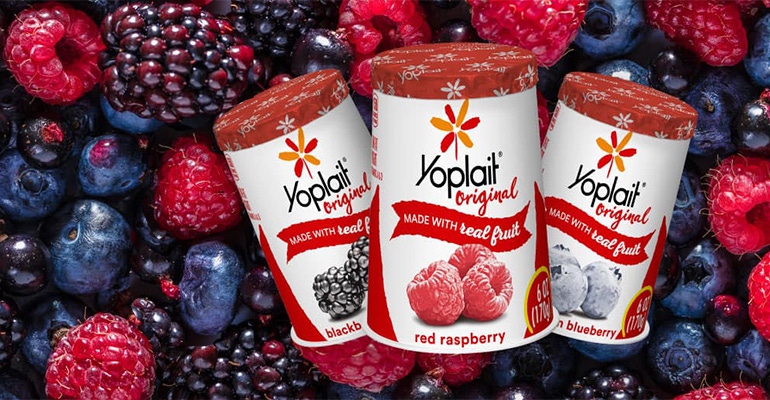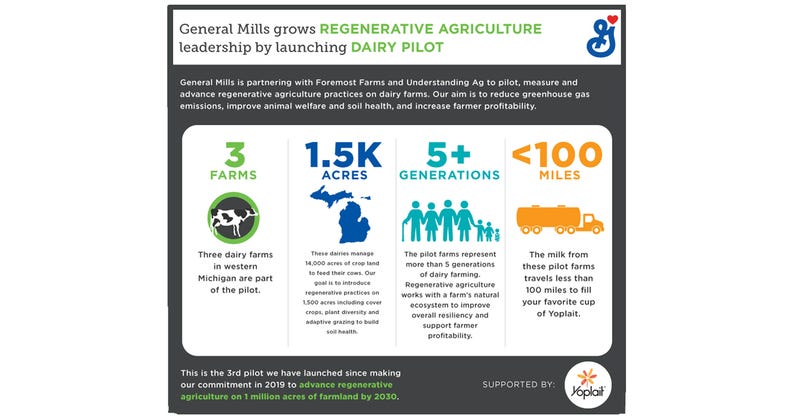Regenerative practices require a holistic approach to managing land, cows and manure, but they benefit the ecosystem and help mitigate climate change.
July 16, 2020

General Mills, the maker of Yoplait, Liberté and Mountain High yogurt products, has announced the start of a 3-year regenerative dairy pilot in western Michigan, a key region for the company's milk supply.
General Mills has partnered with consultants Understanding Ag and dairy cooperative Foremost Farms to pilot regenerative practices and provide support to participating dairy farmers. Implementing regenerative practices on dairy farms requires a holistic approach to managing land, cows and manure.
This is the third regenerative agriculture pilot that the company has launched—and the first for its dairy ingredient supply—since committing in 2019 to advance regenerative agriculture practices on 1 million acres of farmland by 2030.
“In order for regenerative agriculture to be successful, it must first be economically viable for farmers as a lever to help build operational and financial resilience,” said Mary Jane Melendez, chief sustainability and social impact officer at General Mills. “With this pilot, General Mills is committed to ensuring that the transition to regenerative practices will be beneficial to our dairy partners and enhance the overall health of their farms. We’re excited to be working closely with our supplier Foremost Farms and consultants at Understanding Ag to help us get this work underway and measure the impact.”
The three dairy farms in the pilot, which collectively manage more than 14,000 acres, were chosen because of their proximity to General Mills’ dairy manufacturing facility in Reed City, Michigan, which produces a variety of Yoplait products.
As the pilot begins, Understanding Ag consultants will meet with each dairy farmer to co-develop and implement custom regenerative management plans for a portion of their operation. Throughout the pilot, partners will monitor data and measure impacts to soil, biodiversity, water, animal well-being and farm profitability.
“As an industry, dairy farms have been especially hard hit in recent months and their resiliency is being tested. We believe regenerative agriculture builds and strengthens farmer resilience so they can better withstand pressures, be it societal, financial or environmental,” said Doug Martin, president of the General Mills U.S. yogurt business. “Consumers increasingly want to support brands and companies they trust are acting as environmental stewards. This pilot with Yoplait is a great example of the role our brands can play in unleashing the scale of our supply chain—supporting farmers, promoting animal welfare, and improving the health of the planet, all while delivering a great-tasting product.”

Benefits of regenerative agriculture are multi-faceted
Regenerative agriculture is a holistic, principles-based approach to farming and ranching that seeks to strengthen ecosystem and community resilience. These practices pull carbon from the air and store it in the soil and might help the land be more resilient to extreme weather events. Additionally, regenerative agriculture practices help to increase water infiltration, improve nutrient cycling, and reduce soil erosion which have been shown to positively impact the quality of nearby lakes, rivers and streams.
These benefits can translate to farmers’ pocketbooks by ensuring that more nutrients stay in the field to be absorbed by plants rather than lost to wind or water erosion. Regenerative practices on dairy farms can look slightly different than row crop farms, specifically incorporating adaptive grazing on pastures and cropland.
"In the midst of very challenging times for dairy farmers, the Michigan pilot is designed to substantially build soil health, mitigate harmful runoff and erosion, restore natural ecosystem function, and revitalize farm and rural economies,” said Allen Williams, a sixth-generation farmer and rancher and founding partner at Understanding Ag. With a doctorate in livestock genetics from Louisiana State University, he spent 15 years as a professor and has published hundreds of articles in scientific journals and other media.
“These practices will lead to a cleaner environment, healthy climate, and improved quality of life for the farmers themselves," he said.
“Our goal around sustainability is to measure stewardship and member-owner success so we continually explore partnerships with industry experts and customers,” said Greg Schlafer, president and CEO, Foremost Farms USA. “The Regenerative Dairy Pilot Program in Michigan gives our farmers the chance to reduce water and wind erosion all while providing top quality feed to their animals. A highly nutritious diet helps ensure healthy, productive cows, which in turn contributes to a stronger bottom line on the farm.”
Research partners to develop modeling tools
Additionally, General Mills is supporting a team of leading researchers from Cornell University and the University of Wisconsin to model holistic impacts from change in farm management practices. This team is developing data-driven tools that will empower dairies to build resiliency in their businesses and the dairy ecosystem. Models will be adapted and used to inform actions in the Michigan pilot.
This announcement builds upon the company’s bold commitment to advance regenerative agriculture on 1 million acres of farmland by 2030.
In March 2019, General Mills launched a regenerative oat pilot with 45 farmers across North Dakota and the Canadian provinces of Saskatchewan and Manitoba, implementing practices on more than 50,000 acres of farmland. In January, the company launched its second pilot with 24 farmers growing wheat across a collective 17,000 acres in central Kansas. These pilots will also measure the environmental and economic outcomes over the duration of their respective 3-year programs.
Source: General Mills
You May Also Like


